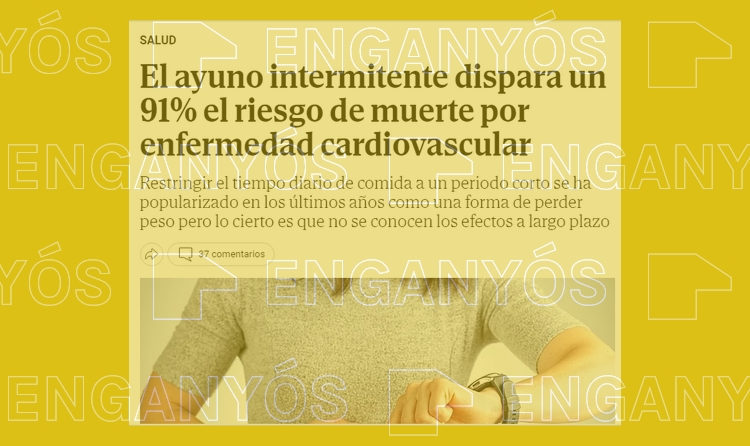No study has shown that intermittent fasting dramatically increases the risk of cardiovascular death “by 91%”

What has been said? That only eating during an eight-hour period and fasting the rest …

What has been said?
That only eating during an eight-hour period and fasting the rest of the day dramatically increases the risk of cardiovascular death by 91%.
What do we know?
The headlines are based on an observational study that does not allow a cause-and-effect relationship to be established. The results were presented on a poster at a conference, but they had not yet undergone a peer-review process and no methodological details have been revealed that would allow any similar conclusion to be drawn.
You’ve asked us via our WhatsApp channel (+34 666 908 353) about a series of headlines in newspapers such as El Mundo or La Vanguardia – which reprinted news from the EFE and Servimedia news agencies, respectively – claiming that a certain type of intermittent fasting which involves condensing all meals into a window of eight hours per day dramatically increases (“by 91%”) the risk of dying of cardiovascular disease.
This claim is MISLEADING. It was gleaned from the results of an observational study which was based on surveys of the diets of 20,000 people. The study does not allow a cause-and-effect relationship to be established between a dietary habit and cardiovascular death. What’s more, until now, the authors have only published an abstract of the study and a poster at a conference, and neither of the publications have been peer reviewed.
“Intermittent fasting dramatically increases the risk of death from cardiovascular disease by 91%”
However, the study in question is observational and retrospective: the scientists analysed the responses of 20,000 Americans about their dietary habits in a survey conducted between 2003 and 2018, which they then cross-referenced with data on deaths in the United States between 2003 and 2019. The approximately 400 people who ate all their meals in an eight-hour period and fasted the rest of the day showed a higher prevalence of death from a cardiovascular accident than those who did not follow this dietary habit.
“Although the study identified an association between an 8-hour eating window and cardiovascular death, this does not mean that time-restricted eating caused cardiovascular death”, Victor Wenze Zhong stated in a press release. Zhong is professor and chair of the Department of Epidemiology and Biostatistics at the Shanghai Jiao Tong University School of Medicine in China, and one of the authors of the study.
“The headline [of the news] is absolutely exaggerated”, Manuel Anguita concurred in statements to Verificat. Anguita, who is the spokesman of the Spanish society of Cardiology, added: “The results of this study do not allow us to draw the conclusion that intermittent fasting exhibits a health risk”. The expert sees the poster as a “warning” about “the possible link” between a specific type of intermittent fasting and “increased cardiovascular mortality in the very long term”, but he notes that “it could also be a coincidence”.
An unreviewed study that does not provide any details
The doubts stem from the numerous limitations of the study. Aside from its observational design, the study’s first and most important limitation is that it is preliminary. It was not published in any journal, nor has it been peer reviewed – a process in which other experts in the field compare the analyses, the methods used, the results and the conclusions of a study. The American Heart Association (AHA), the organiser of the conference where the poster was presented, explained this.
In fact, the publication consists solely of an abstract and a poster that does not provide any key details about the patients or the methodology of the study. For example, we do not know what type of diet the participants had other than the restrictive eating schedule. “Without this information, it cannot be determined if nutrient density might be an alternate explanation to the findings,” Christopher D. Gardner stated in a press release. Gardner is the director of Nutrition Studies at the Stanford Prevention Research Center.
“It will also be critical to see a comparison of demographics and baseline characteristics across the groups”, he stated, including “weight, stress, cardiometabolic risk or other factors associated with adverse cardiovascular results”. We must remember that the study involved people in the United States, who have different eating habits from Europeans.